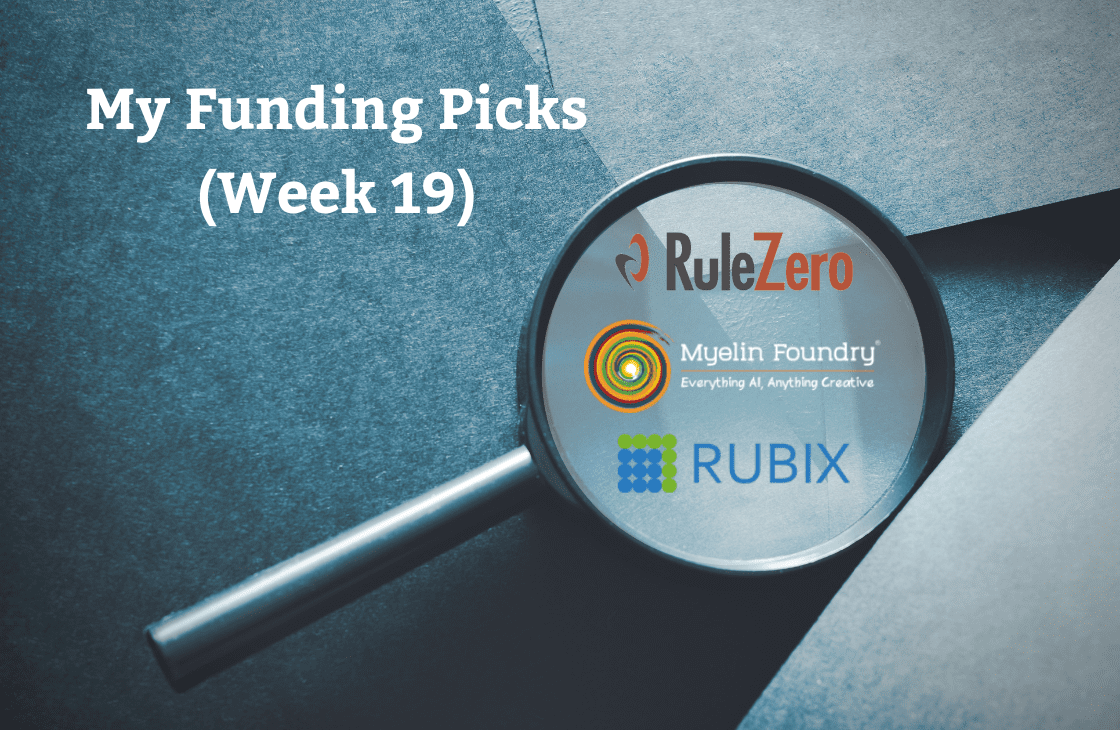Every Monday, I sit with my team to review the funding activity of the previous week. From that list, I pick out a few companies that I would have loved to invest in or find founders doing similar things. Here is my rationale behind this weekly exercise.
Last week 13 startups raised $9 million, indicating a drop in funding in terms of the total amount raised and the number of startups that closed funding rounds. The ecosystem may need a halt after the flurry of activity that has taken place in the best 4-month start for a year in the history of Indian venture capital.
The overall indicators continue to point to 2021, finishing the year off strongly and setting the 2020 decade!

After sifting through the news (aggregated from Tracxn, Inc42, and YourStory), I picked three as my favorite funding news from last week!
Name: RuleZero
Amount Raised: Rs 10 crore from Zerodha-backed fund and incubator Rainmatter Capital
What does RuleZero do?
Edited from Tracxn: Cap table management software for businesses. It digitizes & automates transactions, maintains ownership records and compliances. It features the generation of agreements for due diligence, customized models for financing & ownership, automated compliance, and more.
Why do I like RuleZero
RuleZero is an essential ecosystem-building company. The growth in the number of venture capital funds, family offices, and HNIs participating in the startup ecosystem is an opportunity. The platform could make a paradigm shift for people like me who have direct and indirect participation in over 100 startups and use Excel to manage their portfolios.
Getting a platform that streamlines where all my equity is at, its current value, the latest updates from the founders, budgets, etc., would significantly simplify my daily routine! A RuleZero would be the perfect company with Sevanta for me (instead of Excel).
On the flip side, a RuleZero would make it easy for a company to communicate with their captable and update them regularly. The RuleZero founders could leverage their access to cap tables to figure out secondary transactions for investors. It is a long shot but a critical problem to solve.
I am reaching out to them for an enterprise purchase for my portfolio
Name: Myelin Foundry
Amount Raised: $1 million from Japanese venture capital firm Beyond Next Ventures.
What does Myelin Foundry do?
Edited from Tracxn: Myelin Foundry is a video distribution solution provider. It helps deliver ultra-HD zero-rebuffering streaming on any network and reduces the time and cost to market and deliver AI-powered content.
Why do I like Myelin Foundry?
In a world where videos are increasingly getting integrated into our life Myelin Foundry is an exciting application. The ability to stream high-quality video on any network with zero buffer will get many takers, primarily due to the demands of work-from-home life that is here to stay.
What I (especially) love about this company is its team. It is a well-balanced outfit with the potential to crack this market.
Name: Rubix
Amount Raised: Rs 6.2 crore from Cactus Venture Partners, family offices, and angels.
What does Rubix do?
Edited from Tracxn: Rubix Data Sciences provides a business intelligence platform for credit risk management and monitoring. The platform offers companies data with analytics and visualization to improve credit, risk, compliance, and supply chain decisions.
Why do I like Rubix?
In a data-starved market like India, counterparty risk usually gets underplayed in the name of growth. There are notorious late-payers in the Indian corporate ecosystems, but most Indian SMEs deal with them to continue growing but end piles of bad debts. I am sure that any Indian founder with more than a half-decade in business will have horror stories of the bad debts they’ve incurred.
When investing in Karza, I realized that banks and NBFCs lacked access to in-depth data on SMEs making intuitive sense to invest in alternative credit scoring algorithm startups. That was the first line of defense; the next frontier is giving these assessments for suppliers and customers to evaluate counterparty risks. Rubix just came and answered all these questions for me.
It will be interesting to see how that adoption would work and see the accuracy of their algorithms – I have a list of customers (including me) waiting eagerly!






